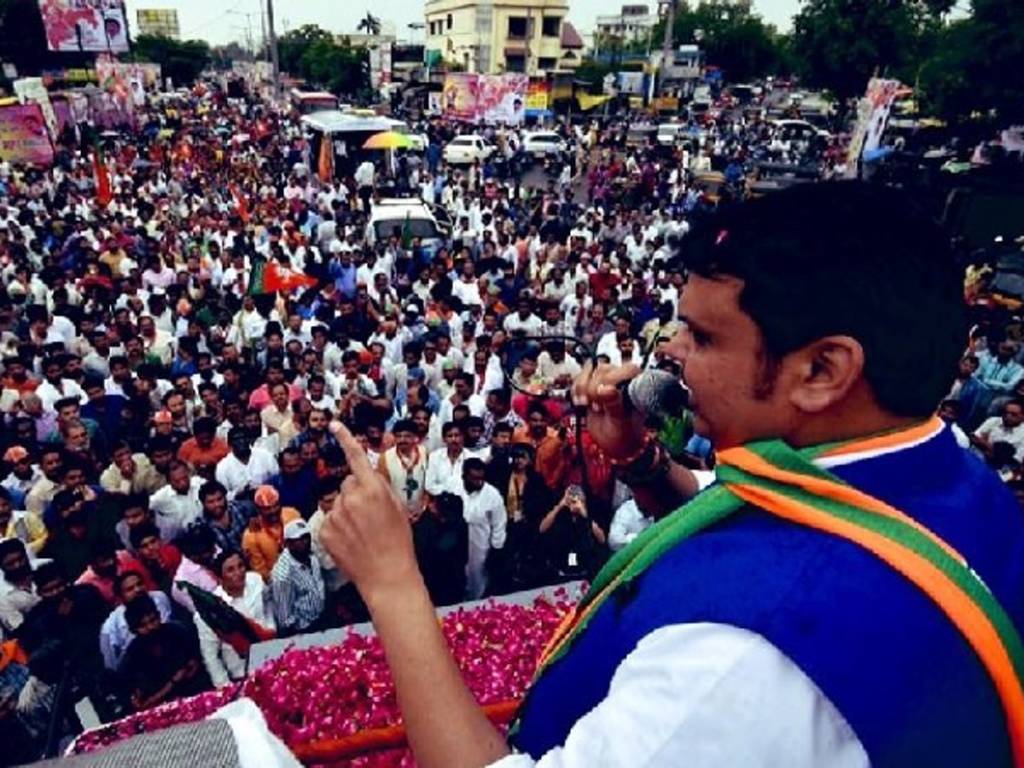Maharashtra, economically most important state in the country, will face elections in less than two weeks. Given the unpreparedness of opposition and popularity of Devendra Fadnavis, win for BJP-Shiv Sena coalition looks like a cakewalk. The Congress-NCP alliance is not even willing to give a fight to the incumbent coalition.
There is one person who managed to make the ruling coalition undefeatable – Devendra Fadnavis. In last five years, the young chief minister of the state proved a masterful orator, shrewd tactician and skillful governor. His popularity made the opposition so weak, that the national leaders including PM Modi did not felt the obligation to campaign in the state.
Fadnavis was very unlikely choice for the post of chief minister. The politics in the country was ridden by caste based loyalties before 2014, and BJP chose a Nagpuri Brahmin to the topmost executive position of the state. He himself admitted this in a rally in Nashik, “I express my deep gratitude to the PM for reposing his faith in me to lead the state in 2014. It was a bold decision, as it did not conform to the traditional norms of social engineering,” said Fadnavis.
Brahmins account for only 3.5 percent population of the state. The politics of Maharashtra has been dominated by Marathas who constitute 32 percent population. In last six decades of state’s existence, Shiv Sena’s Manohar Joshi was the only other Brahmin chief minister.
When Fadnavis was chosen for the post, political analysts said that BJP has made a huge mistake, as the Marathas within BJP would very soon carry out a coup against the Brahmin chief minister. The Maratha leaders of Congress and Shiv Sena said that ‘Peshwai’ is back with Fadnavis’ placement on the top post.
The biggest problem Fadnavis faced was the task to consolidate Maratha votes in the state despite being a Brahmin. Historically, Brahmins and Marathas in the state did not go hand in hand. The problem knocked his doorstep very soon in the form of Maratha reservation agitation. Fadnavis government awarded ‘reservation’ to Maratha community but the execution is stuck on the door of apex court of India.
The second problem faced by Fadnavis is- its troublesome ally Shiv Sena. So far, he has managed turbulent relations with Shiv Sena very skillfully. The troublesome ally keeps hurling accusations on his governance records but he had not made a single statement about the Thackerays or the party. But Fadnavis weakened the party and turned Shiv Sena’s MLAs loyal to himself.
Writing for the Indian Express, Girish Kuber, editor of Jansatta analyzed “Fadnavis kept the Sena at bay with the carrot-and-stick approach: The carrot of offering them “lucrative” posts, while the stick was the fear of breaking the party.” “It may sound strange, but today a large number of Sena MLAs owe their allegiance to Fadnavis, not to Uddhav Thackeray,” he added.
The Shiv Sena-BJP alliance was formed in 1989 and the understanding was that-Being a national party, BJP will get more seats in National elections while Shiv Sena will contest more seats in assembly election. But after Bal Thackeray passed away in 2012, Sena became a toothless tiger. In 2014, BJP asked for equal number of seats in the assembly election but Sena refused, and this led to end of 25 years alliance. The parties fought separately and under the leadership of Fadnavis, BJP bagged 122 seats, almost double of Shiv Sena. The parties made a post poll alliance to form the majority government which ruled the state for last five years.
In the 2019 assembly election, Fadnavis managed to make Shiv Sena junior partner. BJP unilaterally announced that it would not contest less than 164 seats and SS had to satisfy with 124 seats, as it was left with no options. For the first time in the history of Maharashtra assembly elections, Shiv Sena will fight as junior partner to BJP.
The third problem faced by Fadnavis was alienation of Farmers. He has tried to solve this problem by liberalizing the agriculture and implemented series of reforms for this.
In July 2016, the Fadnavis government removed fruits and vegetables from the purview of the APMCs. Farmers were now allowed to sell these perishable items anywhere, without being restricted by the location of mandis or specific markets. To make sure that the farmers did not lose out, the Fadnavis government also provided the initial push in setting up municipal markets across all large cities in the state.
In August 2017, the Maharashtra assembly passed a bill allowing farmers to vote in the elections of these committees. Thus far, the committee management bodies were elected by voting rights granted to only a few members, a form of oligarchy at a cooperative level. Allowing all members to vote in these elections will in the longer term change how these bodies interact with the small and marginal farmers. The bill was opposed tooth and nail by the Congress and the Nationalist Congress Party. But the government had the required numbers with Shiv Sena supporting the move.
In last five years, Fadnavis had shown exceptional governance skills, an appetite for market based economy, and delivered corruption free five years to the state. He has managed to consolidate support for the BJP across caste lines, handled the Maratha problem, controlled Shiv Sena, and has been able take many steps for the benefit of farmers. The incumbent alliance is confident to get another term under the leadership of Fadnavis, and given the chaos in opposition, it is very likely outcome on October 23.
